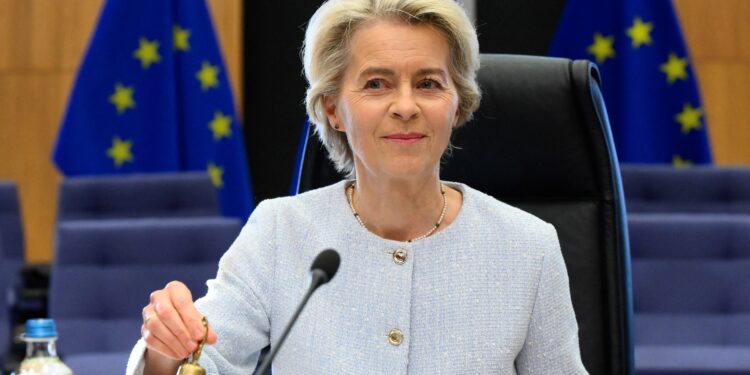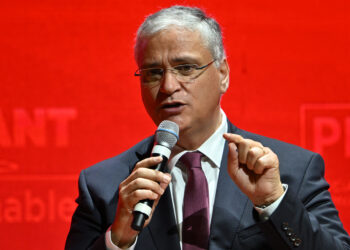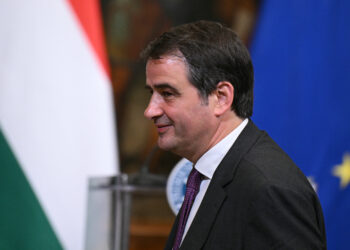Brussels – For now, there are no official documents, let alone precise figures to refer to, but rumours continue to circulate in the European capital about the revolution that Commission President Ursula von der Leyen is allegedly about to enact with the next EU budget, which will cover the budgetary period 2028–2034. According to the (tiny) information available to date, the very structure of the Multiannual Financial Framework (MFF) will be turned upside down in the direction of centralisation of powers and political discretion, which will be concentrated even more in national governments.
The EU chief executive’s worry seems to be the same as that of former Italian Prime Minister Mario Draghi: the loss of competitiveness of the EU vis-à-vis the giants of the global economy, China and the United States. And so, to incentivise member states to get their act together, von der Leyen would like to remodel the next MFF along the lines of the European Recovery and Resilience Fund (ERF) on which national plans (the infamous NRRPs) depend. That is to say, centralised—i.e., national— management of resources and conditionality of disbursements to the progressive implementation of more or less structural reforms.
This means that chancelleries would have much greater leeway in deciding how to spend European funds, which would no longer come from programs established at the EU level but would be proportionally apportioned among the Twenty-Seven based on a set of criteria (likely population, GDP and other such indicators). There would no longer be a plethora of common programs that each member state draws on (currently, there are over 530) but 27 national plans that include resources for all priorities indicated by Brussels. In theory, this reform should aim at a comprehensive simplification of the Union’s monstrous budget and ensure that the European budget is protected (e.g., against violations of the rule of law).
The two funds affected more than the others by this revolution would be those on which the Common Agricultural Policy (CAP) and the Cohesion Policy are based, each of which currently “consumes” about a third of the EU budget. This, at least in von der Leyen’s plans, should make it possible to free more resources for defence and security, investment in strategic technologies (including through the STEP platform) and development of a European industrial policy.
Pushing in this direction, needless to say, are mainly the so-called “frugal” states, with Germany in the lead, but also the Netherlands and the Scandinavians. At the same time, the idea of disrupting CAP and cohesion makes other chancelleries, including France and Poland, turn their noses up. Paris is the leading gross beneficiary of the European agricultural funds: over the current budget period (2021-2027), France is expected to pocket more than €386 billion from this item of the EU budget alone. On the other hand, Warsaw is the member state receiving the most cohesion funds: €392 billion in the current seven-year period.
Ironically, the person charged by the EU executive with carrying out this multi-year budget reform is Polish Piotr Serafin, a former adviser to the current premier, Donald Tusk, when he was president of the European Council between 2014 and 2019. In the mission letter of the Commissioner-designate for Budget, it can be read that among his tasks will be to “develop a new approach for a modern and strengthened budget,” which is no longer “program-based” but based on the policy priorities of the new College. At the centre, “a plan for each country linking key reforms to investments” should be implemented “where EU action is most needed.”
Among the most vocal opponents of this approach, however, is the Committee of the Regions (CoR), which recently has harshly criticised the “nationalisation” of the cohesion policy that would result from the von der Leyen-Serafin-targeted reform (and in which the Italian commissioner-designate Raffaele Fitto, who is expected to get precisely the Cohesion delegation, would also be involved). For regional and local authorities, changing the governance structure to entrust it to the states means altering the very ratio of Cohesion Policy, which would consequently lose the link with the territories and end up politicising itself even more by becoming a pawn in the power relations between Brussels and the capitals.
The negotiations for the next MFF will formally open in 2025 (perhaps even in autumn), and they are expected to be very hot. The tug-of-war has just begun, and it is a safe bet that it will last a long time. One of the most politically sensitive points will be the question of own resources, that is, those that the EU can raise independently without going through national contributions. The possibility of issuing common debt at the EU level has been debated since time immemorial: historically, it has always been taboo for the aforementioned club of rigorists, who, however, have granted an exception with the Next Generation EU for post-pandemic recovery, which will be financed by raising money on the international markets through bonds guaranteed by all twenty-seven member states.
But despite the pressures from Paris, Rome, and Madrid, it is not certain that the game can be repeated, at least according to the current climate in, for example, Berlin—where the CDU/CSU, to which von der Leyen herself belongs and which is likely to return to government next September, strongly opposes any kind of Eurobonds. So far, on the issue, the chairwoman of the EU executive has always sent the ball back into the national governments’ court.
English version by the Translation Service of Withub






